Search
Remove Ads
Advertisement
Summary 
Loading AI-generated summary based on World History Encyclopedia articles ...
Search Results
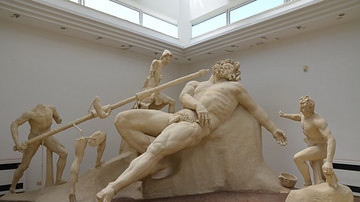
Definition
Cyclops (Play)
The satyr-play The Cyclops was written by Euripides, one of the great Greek tragedians, in 412 or 408 BCE. Like many of his fellow tragedians, Euripides centers his play on a well-known story from Greek mythology. The Cyclops is based on...
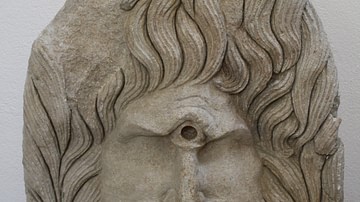
Definition
Cyclops (Creature)
A cyclops (meaning 'circle-eyed') is a one-eyed giant first appearing in the mythology of ancient Greece. The Greeks believed that there was an entire race of cyclopes who lived in a faraway land without law and order. Homer, in his Iliad...
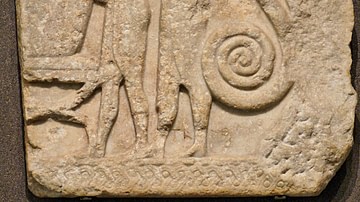
Definition
Agamemnon (Play)
The play Agamemnon was written by one of the greatest Greek tragedians Aeschylus (c. 525 – 455 BCE), “Father of Greek Tragedy.” Older than both Sophocles and Euripides, he was the most popular and influential of all tragedians of his era...
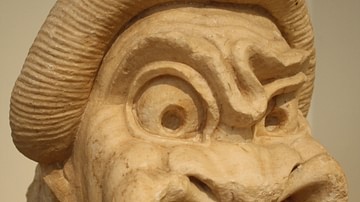
Article
The Plays of Cratinus
Cratinus was a highly successful writer of Attic Old Comedy, but the very fragmentary nature of his surviving plays means that he is not as well remembered as Aristophanes (eleven of whose plays come down to us intact). Despite this, it is...
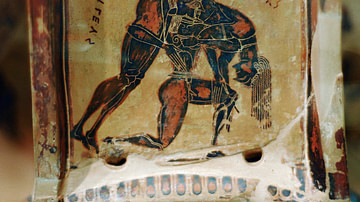
Definition
Ajax (Play)
Ajax is a play written by the 5th-century BCE Greek poet and dramatist Sophocles. Although Sophocles wrote at least 120 plays, only seven have survived. Of his surviving plays, the best-known is Oedipus Rex (Oedipus the King) - part of a...
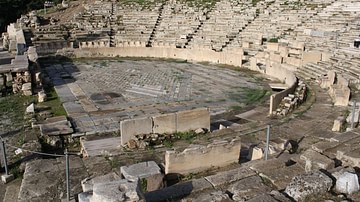
Definition
Plutus (Play)
Plutus (aka Wealth) is a play written by the great Greek comedy playwright Aristophanes in 388 BCE. It was the last of his plays to be performed during his lifetime. Like his earlier play Ecclesiazusae (The Assemblywomen), Wealth was written...
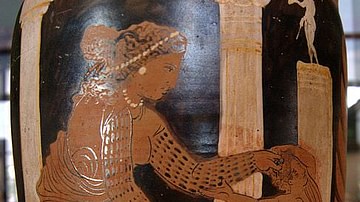
Definition
Medea (Play)
The tragedy Medea was written in 431 BCE by Euripides (c. 484 – 407 BCE). Euripides authored at least 90 plays of which 19 have survived intact. As with the plays by Sophocles and Aeschylus, the audience was already well aware of the myth...

Definition
Helen (Play)
Helen is a Greek tragedy by Euripides (c. 484-407 BCE). It is usually thought to have first been performed at the Great Dionysia of 412 BCE and was part of the trilogy that included Euripides' lost Andromeda. Helen recounts an unusual version...
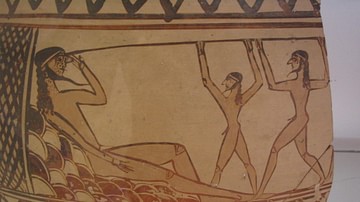
Image
Odysseus Blinding the Cyclops
A polychrome Krater fragment (mid 7th century BCE) depicting the blinding of the Cyclops Polyphemus, one of Odysseus' many adventures on his long voyage home to Ithaka following the Trojan War. (Argos Archaeological Museum, Greece)
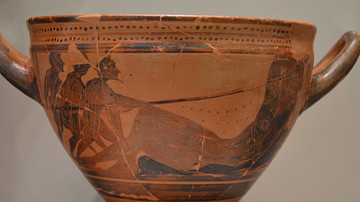
Image
Odysseus blinding the Cyclops
Attic black-figure skyphos depicting Odysseus blinding the sleeping Cyclops Polyphemus, by the Theseus Painter, from Boeotia (Greece), 490-480 BCE. (Altes Museum, Berlin)